The INFJ and INFP Relationship: An In-Depth Guide
What happens when INFJs and INFPs fall in love? Do two of the most intense and idealistic personality types in the Myers-Briggs® system make a good match? These two personality types often have loving and devoted relationships. At the same time, there can be some major roadblocks that they face if they’re unwilling to accept their partners and honor their unique gifts. I spoke to eleven INFJ and INFP couples and found some common themes in their relationship. Between their input and what I know as an MBTI® practitioner, I’m hoping we can give you some useful and practical information for your relationship!
Not sure what your personality type is? Take our new personality questionnaire here. Or you can take the official MBTI® here.

Table of contents
- INFJ and INFP Relationships – Are They Meant to Be?
- INFJ and INFP Relationships at a Glance:
- The Struggles:
- INFJs use extraverted feeling, while INFPs use introverted feeling.
- How Do These Different Feeling Functions Impact the INFP/INFJ Relationship?
- How Misunderstandings Happen:
- INFJs Use Introverted Intuition and INFPs Use Extraverted Intuition
- The Tertiary Function
- How Does The Tertiary Function Impact Relationships?
- The Inferior Function
- How Does The Inferior Function Impact Relationships?
- How INFPs can Help a Stressed INFJ Partner:
- How INFJs Can Help a Stressed INFP Partner
- Summing It Up…
- Tips for INFPs with INFJs:
- Tips for INFJs with INFPs:
Estimated reading time: 26 minutes
INFJ and INFP Relationships – Are They Meant to Be?
At first glance, INFJs and INFPs seem tailor-made for each other. After all, they’re introverts, intuitives, and feelers. Surely a slight difference in the J/P spectrum can’t create a lot of tension, right? Well….it’s not quite as simple as all that.
While it might look like these two types are almost identical twins, there are more differences than you’d realize on the surface.
INFJs and INFPs may share three-letter preferences (I/N/F to be exact) but they share absolutely none of the same primary cognitive functions.
In other words, if INFJs and INFPs were vehicles, they both might look like blue sports cars on the outside. If you looked at them, you might only notice a minor difference (one is a Jaguar and one is a…I don’t know, a Mercedes – don’t ask me which is which, I know next to nothing about cars). Yet even though these two “cars” look nearly identical on the outside, they have very different hardware on the inside.
You can see this in the graphic below that shows their respective cognitive function stacks:
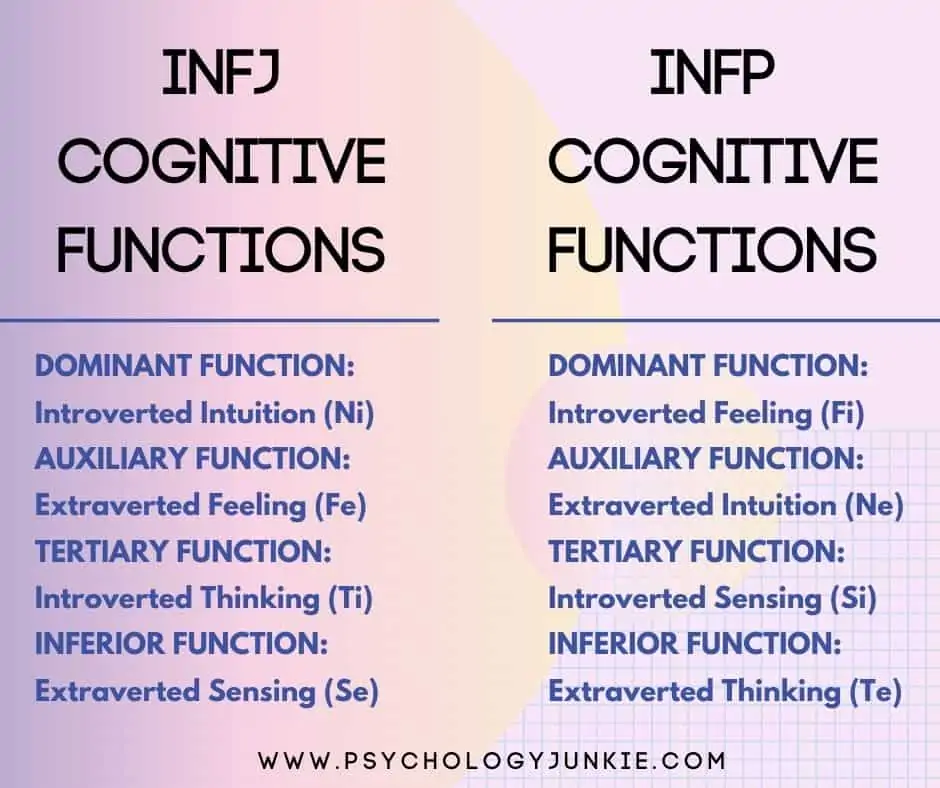
How Cognitive Dynamics Make a Difference:
You might be looking at that graphic and thinking “This all looks like gobbledygook” and you’d be justified in thinking so. If you’re new to type, these cognitive functions can seem needlessly complicated. That’s why I’m going to start this post with the very basics
INFJ and INFP Relationships at a Glance:
Because INFJs and INFPs share three preferences in common they often have mutual interests and comfort zones. As fellow introverts, these two types gladly give each other space and respect each other’s need for alone time.
As feelers, these types both readily empathize with each other and will be conscientious of each other’s feelings. Harmony and adherence to shared personal values will be a crucial facet of this relationship.
As intuitives, both INFJs and INFPs are drawn to big-picture ideas and possibilities. When they explore ideas together, chances are they’ll feel like there’s nothing they can’t do! Together they can catalyze each other towards new heights of growth and discovery.
INFJs and INFPs are both creative types. They’ll enjoy exploring each other’s creative ideas as well as experimenting together. An evening creating art, writing short stories, or simply reading by candlelight will provide deep satisfaction. These two types will treasure moments where they can simply exist together quietly and let their creativity and imagination run the show.
The Struggles:
The challenges in this relationship often stem from their differing cognitive functions (which we’ll get more into later in this article). INFJs like a clear, organized plan for their lives and a sense of where things are going. INFPs are more likely to take each day as it comes and be more flexible. This can result in frustration for both partners as the INFJ wants a long-term agenda and plan and the INFP wants to keep things open-ended. On top of that, INFJs express their feelings more readily than INFPs, who are more likely to mull them over a great while before expressing them. This can create tension as INFJs wonder what their mysterious INFP partners are thinking, and INFP partners wonder why INFJs blurt out half-analyzed feelings with such intensity.
To dive deeper into understanding this relationship, it’s vital to develop a more thorough understanding of each type’s unique mental wiring and why conflicts (and growth) can occur in this relationship.
As you saw before, INFJs and INFPs have completely different cognitive function stacks. If you’re a type nerd like me you’ll understand why that makes a difference, but if you’re a newbie to type then I’m going to try to explain these differences now, hopefully in a simple, easy-to-understand way.
INFJs use extraverted feeling, while INFPs use introverted feeling.
What does this mean?
Extraverted feeling (Fe) focuses on making decisions that maintain harmony in the environment. It’s primarily focused on people and events, situations, and objects and how they impact people. It’s also driven to interact with people, particularly in the realm of emotions.
This can show up in many ways, but one of those ways is in expressing emotions. Just take a look at the graphic below:
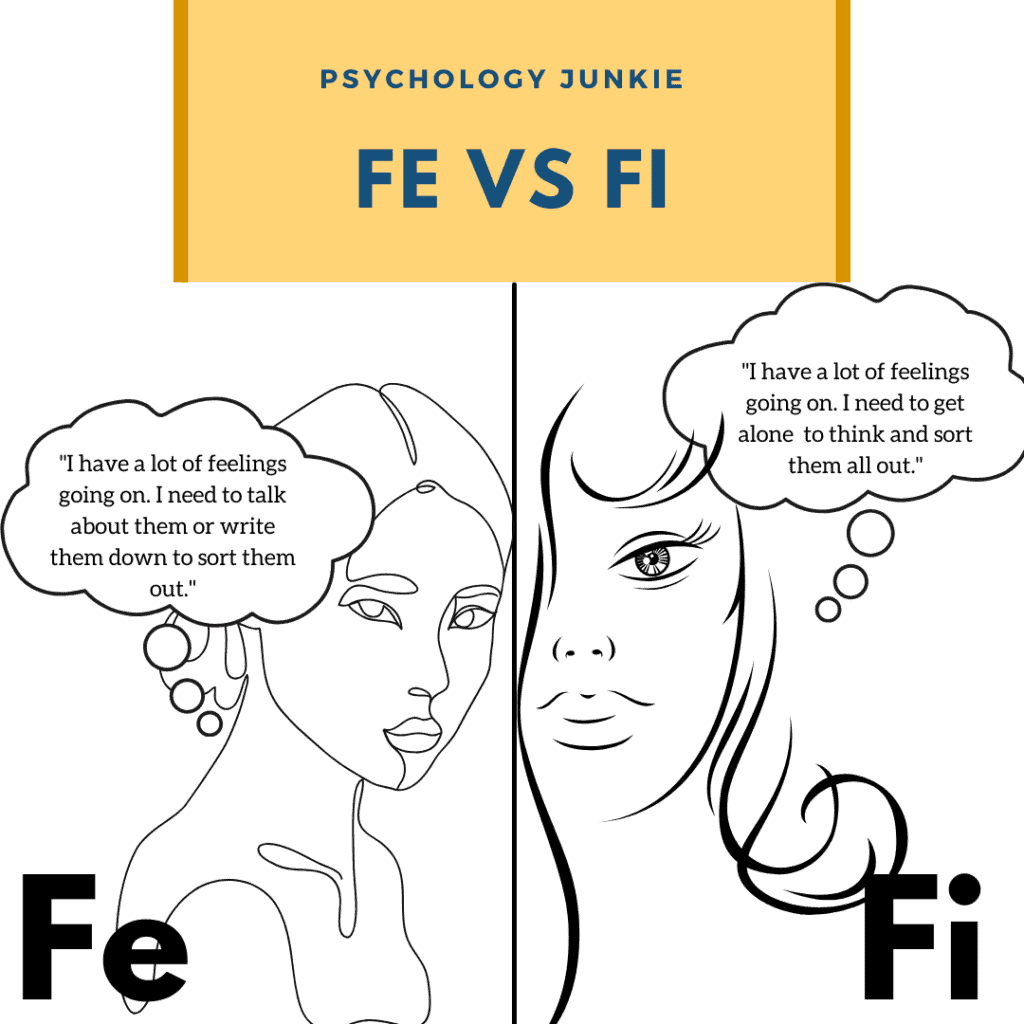
INFJs who use Fe are going to express their emotions in order to understand them. They need to “hash out” their feelings in order to make sense of them and put them together in a logical framework. After they’ve verbalized or jotted down their feelings, they may feel different about them because they will have processed them and will have realized which feelings made sense and which didn’t.
INFJs also focus intently on the feelings of people outside themselves. External harmony is crucial to the INFJ. Because of this, they want to know what people need, what they like, what they dislike, and how they’re feeling. When they have all this data, they know how to unify teams, create consensus, and get everyone working together in a harmonious fashion.
In the book Building Blocks of Personality, Leona Haas and Mark Hunziker state, “Extraverted feeling types work to ensure that everyone is included, heard, and shown respect. They often ask, “What do you think?” or “Are you okay with that?”
INFJs: Part-Time Social Organizers
Because INFJs have extraverted feeling, they are often more in touch with other people’s feelings than they are with their own. They are often analyzing what is best for everyone they love, and trying to organize their world in such a way that people’s long-term needs are getting met. Because of this, INFJs will try to enforce their values if they feel it’s important. They don’t like to be pushy, but they will often have ideas about how people should behave with one another and what the right or wrong way of doing things is. In a positive way we can see this in INFJs like Mahatma Gandhi who formed peaceful protests in order to improve the livelihoods of people in India.
Now let’s talk about Introverted Feeling
INFPs use introverted feeling. Introverted feeling is a decision-making process that focuses on personal values and holds private core values deep within. INFPs seek inner harmony and adherence to their individual code of ethics.
INFPs need to mull over their feelings internally and sort them out on the inside. When an INFP is upset they’re probably going to find a room where they can close themselves away and get in touch with their emotions.
Carl Jung said, “”Still waters run deep” is very true of such types….Their true motives generally remain hidden. Their outward demeanor is harmonious, inconspicuous, giving an impression of pleasing repose, or of sympathetic response, with no desire to affect others, to impress influence, or change them in any way.”
Because INFPs use introverted feeling, they’re not as concerned with external harmony as they are with internal harmony. While almost anyone dislikes conflict, INFPs are more likely to be able to generate a positive inner world even if the outer world isn’t harmonious. They believe that everyone is in charge of their own feelings and they try not to pressure anyone to feel a particular way. While INFJs will try to tailor the morale of the external world to a degree, INFPs are more likely to tailor the external world for their own morale (while also not violating anyone else’s autonomy).

INFPs and INFJs both value and show a great deal of empathy, but INFPs are more hands-off in their approach to managing external emotions. More individualistic, they strive to give everyone space to feel whatever they want – good or bad. Directly intervening in other people’s emotional experiences can feel manipulative or pushy to the INFP. INFJs, in contrast, will typically feel a sense of pressure to help others return to a state of harmony. Thus, they are more likely to intervene if someone in their vicinity is upset or if someone is causing upset. In a negative way, unhealthy INFJs may “rush” people to make peace without allowing them the time to be fully heard.
Finally, INFPs look inside themselves for their values – “What is important to me?” “What matters to me?” While this might seem selfish to some, it can be a powerful way for the INFP to prioritize their life and not get run over by other people’s emotions and whims. INFPs often imbue their creative works with their individual feelings and values. Many famous authors and poets have been INFPs; people like George Orwell, Albert Camus, Antoine de Saint-Exupery, or even Bill Watterson of Calvin and Hobbes fame.

How Do These Different Feeling Functions Impact the INFP/INFJ Relationship?
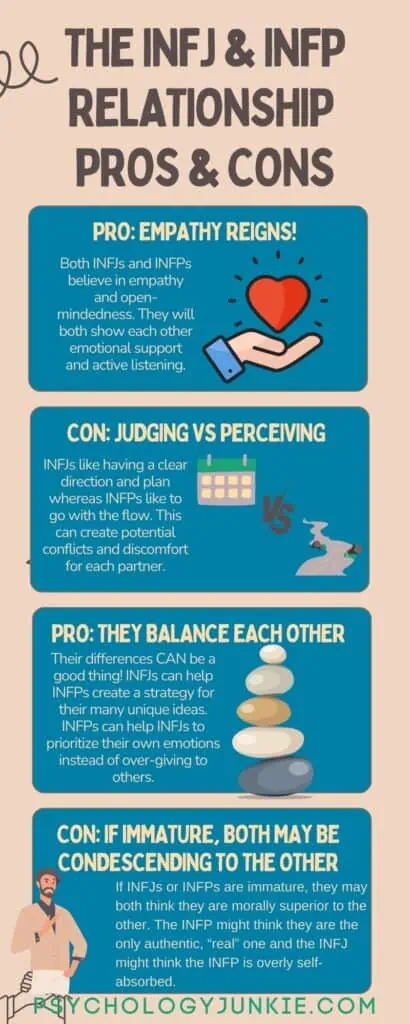
When INFJs are going through their emotions, they’ll often want someone to talk to about them. They “feel out loud.” There’s a reason for this. When INFJs verbalize their feelings they can then process them through Extraverted Feeling. Because INFJs don’t have Introverted Feeling, it’s a challenge for them to process their feelings inside themselves. That would be be like trying to listen to an audiobook without wearing headphones or having an external speaker. When INFJs talk out their feelings, they make sense of them.
Because INFPs have introverted feeling, they can feel like what the INFJ is saying is solidified and permanent, and this can cause problems. An INFJ might vent about something emotional and express a wide variety of colorful feelings but then feel totally different ten minutes later because they “worked it out” and decided they didn’t believe their own feelings. An INFP, when expressing emotions, is much more likely to express the “fully-baked” emotion. When they say what they’re feeling, they’re usually quite certain about its validity and are quite certain they mean what they’re saying.
When an INFJ “extroverts” their feelings, they’re trying to refine them. They’re usually open to advice as long as it’s friendly. They may change their mind about their feelings immediately afterward or once they’ve calmed down. They may not as well. But either way, they’re expressing their emotions to get feedback or simply to refine them and toss out any feelings that weren’t sensible.
An INFP sorts out their feelings on the inside, not the outside. As a result, when they talk out their feelings they’re showing a “fully baked” set of emotions and beliefs. They are typically looking for a listening ear or validation rather than advice or feedback.
How Misunderstandings Happen:
An INFP, thinking the INFJs feelings are “fully baked,” responds seriously to what’s happening. They may turn their life around or react strongly if the emotions being presented are colorful and passionate. Then they may be aghast when the INFJ changes their mindset the next day or even immediately after verbalizing how they feel.
An INFJ, in turn, might hear an INFP verbalizing their emotions and think that the INFP is looking for feedback. When they offer feedback, the INFP might take offense at this. “I just wanted you to listen to me! I didn’t want your advice!” is a common retort. Another common response is, “I already know how I feel. You can’t tell me how I feel.”
In arguments, this presents another issue. INFJs want raw, intimate sharing with their partner. They want to know how their partner is feeling in real-time. If their INFP partner disappears to process their emotions the INFJ can be left in a state of charged anxiety. “Are they mad at me?” “Why aren’t they talking to me?” “They’re shutting me out!”
When the INFP emerges and explains how they feel, the INFJ may offer advice or input. After all, INFJs “check” their emotions and feelings against external sources. In their minds they think, “How can an emotion be valid if it isn’t objectively verified?” Thus arguments can arise because the INFP has conviction about their feelings while INFJs struggle to understand the mysterious inner workings of their partner’s process.
In the same way, INFPs might find the way INFJs express their feelings confusing. They might give INFJs space when they’re upset when really the INFJ needs a sounding board. They may react to the INFJs “emotional unloading” without understanding that this is a necessary process for INFJs. If the INFJ can’t “extrovert” their feelings then they’re going to have a very difficult time understanding and making peace with them.
Harmony Differences
Both INFJs and INFPs crave harmony. But INFJs are going to want to make sure everything “out there” is harmonious more regularly. To the INFP, internal harmony is paramount. They’re not going to put out feelers for how everyone is doing on such a regular basis. They may feel that INFJs are being clingy or people-pleasing in contrast to their own more internalized sense of who they are and what’s needed for harmony. Granted, when INFPs care about someone, they will check-in and show they care. But they’re also more likely to put their own internal harmony above external harmony, and INFJs are more likely to put external harmony (either short or long-term) over internal harmony.
Because of this, INFPs who don’t understand their partners are likely to throw out accusations of “people pleaser!” while INFJs who don’t understand their INFP partners are likely to throw out accusations of “selfishness!”
A caveat: If an INFP is an Enneagram 2 or 9 they may prioritize external harmony in order to have internal harmony.
The truth is, INFPs and INFJs can both be people-pleasing or selfish. These traits are related to immaturity, mental health issues, or a variety of other things.
When INFJs and INFPs understand each other’s differences, then real growth can happen. INFPs can help INFJs to get in touch with their core, non-negotiable values. They can help them to know themselves better and stand up for their individual needs even when those go against the desires of the people around them. This is crucial for many INFJs who struggle to honor their own emotions and needs. The INFP can be a gentle supporter who encourages them to take care of themselves as well as they take care of others.
INFJs, in turn, will tend carefully to their INFP partner’s feelings and stand up for their needs and desires against all odds. They can encourage their INFP partner to express how they feel more openly instead of keeping those feelings internalized for potentially too long.
INFJs Use Introverted Intuition and INFPs Use Extraverted Intuition
What does this mean?
INFPs “extravert” their intuitions. In the same way that INFJs hash out their feelings verbally in order to understand them, INFPs hash out their intuitions in order to understand them. They will verbally express dozens of ideas or alternatives without being “married” to any particular one. The process of exploring the ideas is main thing, and the INFP can jump from idea to idea fluidly and swiftly. They will see random connections and possibilities in the world outside them – they might walk through the forest and see a hundred ways to use the random sticks, stones, and nature objects they collect along the path.
Just like INFJs can change their mind about their feelings post-processing, INFPs can change their mind about their ideas post-processing. Expressing their ideas is their way of “hearing the song” they need to hear. Without expressing their intuition, INFPs feel like they’re trying to hear music without headphones or speakers transmitting it. They enjoy collecting items that evoke a sense of possibility. The INFP’s house might be full of garage sale items, stones, nature objects, and more that they hope to use someday to create something.
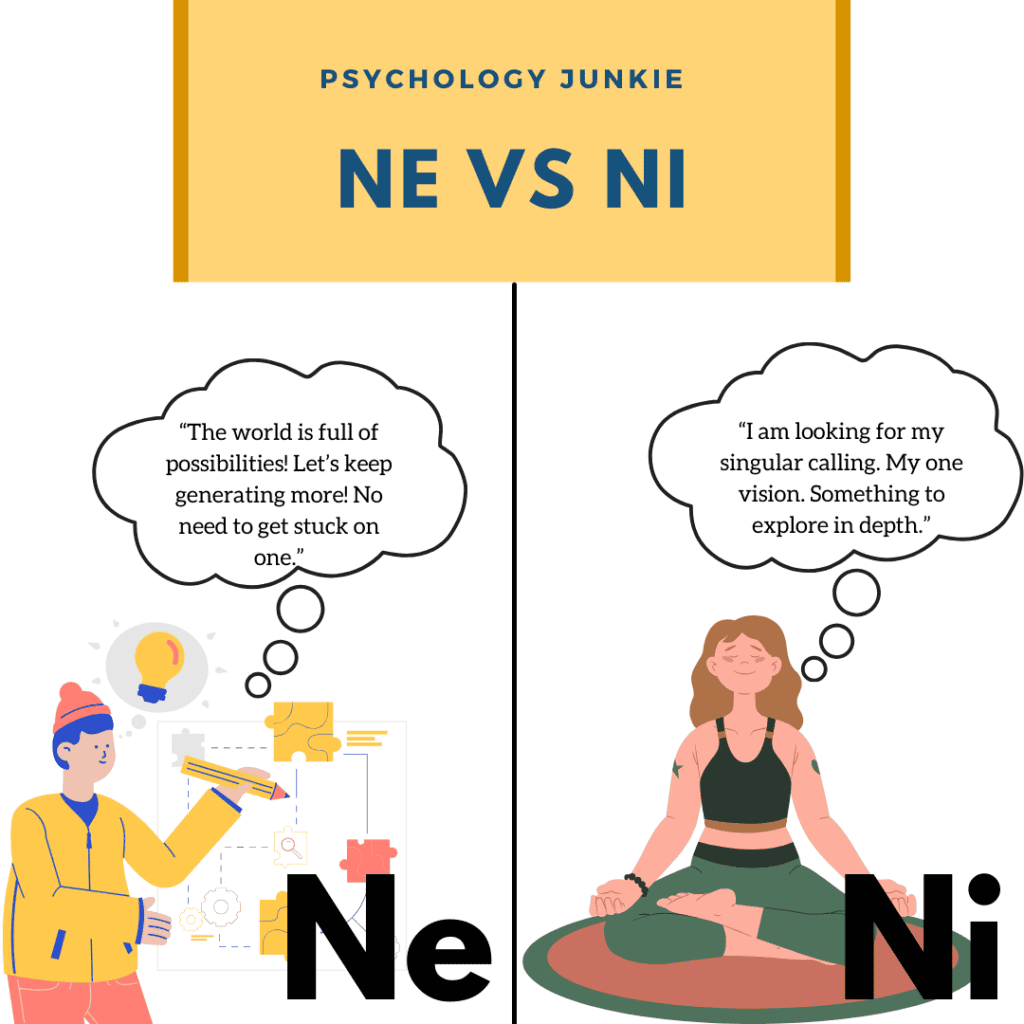
INFJs use introverted intuition. When INFJs have ideas or theories in their mind they need to think them over for a while before talking about them. When their ideas emerge, they’re fairly sure of them. They trust their intuitions and theories because they’ve spent a great deal of time internally processing them, sorting them out, and becoming “married” to the one(s) they see as the most plausible. Thus, when an INFJ discusses their intuitions they expect to be taken seriously. They’re not presenting “half-baked” ideas in order to explore them. They’re usually presenting theories or ideas that they fully expect to come to fruition. An excess of ideas can be overwhelming to the INFJ, and in respect, an excess of items around the house can be overwhelming to them. “When are you going to use this?” Why do we have all these?” can be common questions in an INFJ/INFP household.
How Can These Differing Intuitions Impact Relationships?
INFJs may feel like they can’t keep up with all the ideas and possibilities that INFPs put out into the world. Because INFPs fluidly move from one idea to another and INFJs tend to stick to one with idea or theory, they may think an INFP is serious about an idea only to be aghast when they’ve moved onto something new. This is why INFPs are likely to dabble in many different pursuits at a time while INFJs are more likely to focus on one-thing-at-a-time. They may feel that the INFP lacks conviction about their ideas in the same way that the INFP can feel that INFJs lack conviction about their feelings.
In the same way, INFPs may feel like INFJs are too stuck on one insight or idea without testing it against the external world. If you remember, this is similar to how INFJs can feel about INFPs when it comes to their emotional conviction.
Extraverted functions are likely to be tested against the external world. They’re more fluid, changeable, and understood while being hashed-out.
Thus, INFPs verbalize ideas to test them against the external world. They’re open to feedback, advice, or input. They may change or swap out ideas in this process. They have to externalize their ideas to narrow down the ones they want to pursue.
In the same way, INFJs toss out their feelings to test them against the external world. They’re open to feedback, advice, or input. They may change their feelings or discard certain feelings in the process. They have to externalize their feelings in order to narrow down which ones they still feel with conviction.
Introverted functions are tested against an internal set of standards or rules. They’re processed inwardly longer and when they’re verbally expressed they’re expressed with conviction and a sense of knowing.
Thus, INFPs are likely to feel intense conviction about their feelings because they’ve inwardly analyzed them and tested them against an internal set of values and criteria before they’ve ever verbalized them. They care less whether the outside world accepts them or sees them as valid. The same will apply to their personal ethics and values.
In the same way, INFJs are likely to feel intense conviction about their intuitions and ideas. They’ve inwardly analyzed them and tested them against an internal set of impressions and insights. They care less whether the outside world accepts their ideas or intuitions or sees them as valid. They simply “know” things.
Pulling an INFJ away from their vision or an INFP away from their feelings is like trying to run a race in a field of super glue. They frequently tailor their entire lives around these visions, feelings, or values.
There Are Always Exceptions to the Rule
This is where I jump in and remind you that type isn’t entirely black-and-white. INFJs will have moments where they are married to their feelings and process them inwardly and INFPs will have moments where they’re married to one idea and process it inwardly. But these moments are the exception and not the rule. Just like you can use both your left and right hand, every personality type can use every cognitive function, but one will feel more comfortable than the other. You can find out more about this in my article about shadow functions.
The Tertiary Function
INFJs and INFPs have different tertiary functions. But what’s the point of the tertiary function? And why does it matter that they are different?
The tertiary function is one that provides relief and playful creativity. It’s not the function that INFJs or INFPs “live and breath” (that would be the role of the dominant function). It’s a function that provides refreshment and fun.
For INFPs, the tertiary function is Introverted Sensing (Si) .What’s this all about?
INFPs get refreshment and joy from revisiting traditions and memories. They often have favorite books, movies, and routines that help them to feel calm and creative. Repeating certain activities or re-watching favorite movies can help them to feel calm and nourished. It can also help them to spark their creativity and imagination.
Introverted sensing also helps INFPs stay aware of their body’s needs. When INFPs tap into this function they nourish their bodies through food, drink, bathing, calming music, or some other practice.
For INFJs, the tertiary function is Introverted Thinking (Ti). What’s this all about?
INFJs get refreshment and joy from analyzing their thoughts and parsing out what makes sense and what doesn’t. They enjoy creating a mental taxonomy of how things work. Categorizing information, learning new information, and challenging information in their mind is interesting and fun for them. They might learn about a theory and then read contesting theories to refine their understanding of the theory. They might watch YouTube videos that explain how things are made or listen to lectures about philosophy or psychology.
Introverted thinking also helps INFJs test the logic of their insights and feelings. When INFJs tap into this function they are capable of de-personalizing issues and looking at them from a detached, analytical perspective. They may enjoy debating, problem-solving, or playing strategy games or brain teasers.
How Does The Tertiary Function Impact Relationships?
Because INFJs and INFPs have different modes of relief, it’s crucial that they respect each other’s needs. INFJs should give INFPs space to de-stress and revisit favorite memories and routines. In the same way, giving gifts that tap into the introverted sensing side of INFPs is effective. Gifts that evoke favorite memories or favored snacks and drinks are often meaningful to INFPs.
INFPs can respect the INFJ’s introverted thinking process by letting them analyze things in a detached way. INFJs, even though they are feeling types, can be skeptical and surprisingly detached at times. This can throw people off, especially if they bring up an idea that the INFJ is poking holes in. INFJs can and should be careful not to use this function as a way to deflate the INFP’s enthusiasm, but INFPs should also be conscious that this is just as real a side of the INFJ as their warm feeling side.
INFPs can help support the INFJ’s thinking side by playing strategy games with them, discussing and analyzing various topics, or simply allowing them to be detached and analytical sometimes instead of always being in a “feeling” headspace.
The Inferior Function
The inferior function is an area that causes each personality type to “trip up.” Everybody wishes they could excel at use of their inferior function, but it’s a struggle and takes a lot of practice. We don’t usually mature into our inferior function until our 60s or 70s, and even then it still isn’t as strong as our dominant function.
The inferior function also bubbles up during times of intense stress. Typologists call this eruption “grip” stress.”
INFJs have inferior extraverted sensation (Se). Extraverted sensation focuses on the external environment in all its vivid detail. It also focuses on immersion and action in the external world. Because this is the INFJs inferior function, they often struggle to track details in their environment or take swift action. They are more “heady” than they are physical. They may miss out on experiences or struggle to handle a lot of incoming sensory data as a result.
During grip stress, INFJs can be taken over by the inferior function. When this happens, they become reckless, impulsive, and focused on sensory details. They may blow all their money on clothes or vacations. In a restless haste, they may frantically clean everything in their room until it’s pristine. They may pursue risk, adventure, and sensory pleasure as a way of drowning out their stress.
INFPs have inferior extraverted thinking (Te). Extraverted thinking focuses on efficacy and logic. It focuses on objectively organizing the external world so that objectives can be reached swiftly. Because this is the INFP’s inferior function, they often struggle to organize their goals in a step-by-step, effective way. They are more in touch with what their ideals and values are, than how to implement them in the outside world. They may struggle to achieve their goals or look at things objectively as a result.
During grip stress, INFPs can be taken over by their inferior function. When this happens, they become detached, critical, and focused on getting things done. They may frantically re-organize their home, become hypersensitive about their own and others’ mistakes, or become short-tempered and blaming. They often feel overwhelmed by an urge to solve problems or “fix” things.
How Does The Inferior Function Impact Relationships?
INFJs and INFPs respond very differently to stress, but as fellow introverts, there are some things they both have in common:
- Both need space and time alone
- Both will become more reactive and impulsive
- Both will feel mentally foggy and overwhelmed
- Both will behave in ways that are typically unlike them
There are some very stark differences in how these two types react as well. And this can play out in relationship conflicts as a result.
When INFJs get into a self-indulgent, sensory state, INFPs may find them reckless, gluttonous, or hedonistic (and they may be justified in thinking this as well). They might lash out at the INFJ and berate their irresponsibility.
How INFPs can Help a Stressed INFJ Partner:
- Acknowledge the INFJ’s stress and listen
- Give them space
- Validate their feelings and let them “vent” (just remember they may be venting feelings that they later disagree with)
- Encourage them to use their sensing side in a healthy way. Blast music with them and dance around the house. Take them on a drive to somewhere new. Go to the beach and splash around. Go to an arcade or play a video game. Do something fun and silly and immersive if they seem open to the idea. You can also pursue a less-intense method, like drawing a hot bubble bath for them or giving them a massage.
- Realize that this is the result of extreme or chronic stress and don’t hold them to the same standard you would during a typical day. If possible, excuse them from some responsibilities or look at your lives and examine whether there are any patterns that are leading to this form of stress.
When INFPs get into a critical, hyper-focused, blaming state, INFJs may find them harsh, domineering, or overwhelming (and they may be right in thinking this as well). They might lash out at them and mock them for their behavior.
How INFJs Can Help a Stressed INFP Partner
- Acknowledge the INFP’s stress and listen
- Give them space
- Validate their feelings and let them “vent” (just remember they may be especially harsh and critical and regret it later)
- Encourage them to use their thinking side in a healthy way. Fix something easy with them that’s not too overwhelming. Watch a stupid movie and critique all the logical loopholes in it. Have a yard clean-up day or organize a bookshelf by category, alphabet, or color.
- Realize that their reactions are the result of extreme or chronic stress and don’t hold them to the same standard you would during a typical day. If possible, excuse them from some responsibilities or look at your lives and examine whether there are any patterns that are leading them to this form of stress.
Summing It Up…
There are a lot of pros and cons to this relationship. If you want to experience more of the pros and less of the cons, take some time to study each personality type in-depth. You can do this by exploring my two ebooks: The INFJ – Understanding the Mystic or The INFP – Understanding the Dreamer.
You can also follow some of these basic tips:
Tips for INFPs with INFJs:
- Let INFJs express their feelings in real-time. But don’t judge too readily. Realize that they may feel differently about their feelings or completely disregard some of them after they’ve expressed them and absorbed them.
- Don’t give INFJs the silent treatment when you’re upset. Try to express what you can so that they aren’t in limbo and confused when there’s a disagreement. Realize that sometimes when you “get away” to process your feelings they might think you’re mad at them even if you’re not.
- Respect the INFJ’s need for closure and a clear plan. If this isn’t for you, let them know. If they know what your comfort zone is and how you like to live, they’ll simply include that in their long-term plans.
- Realize that disharmony is going to be deeply unsettling to INFJs and they may feel an urgent need to “fix” the atmosphere. Try to remind them that they are not responsible for everyone else’s feelings. Use your strengths as an INFP to help them tap into their individual desires, needs, and values.
- Take their intuitions and insights seriously. Realize that they have the same inner focus on their visions and ideas that you have on your feelings and personal values. Realize that they may tailor their entire lives around these visions or ideas.
- When they’re stressed, help them experience sensation in a healthy way, give them space, and realize that they are likely going to be irrational. Be patient unless they’re harming anyone.
Tips for INFJs with INFPs:
- Let INFPs express their intuitions and ideas in real-time. But realize that they are exploring ideas, not deciding on them. While you tend to pick one theory and dig in fully, they wander through many theories or ideas and enjoy the process rather than fixating on one. Let them brainstorm, explore, and theorize without pushing them to “marry” one idea.
- Don’t badger the INFP when they aren’t talking about their feelings right away. Realize they may not be mad at you or feeling anything negative about your relationship. Give them space to sort out their feelings on their own. Let them know that you’d like to know what they’re feeling whenever they’re ready and then let it go.
- Respect the INFP’s need for flexibility. A lot of structure and rigid planning can make an INFP feel trapped and overwhelmed. Make room for flexibility and spontaneity in their lives and don’t plan out every single part of the day.
- Realize that INFPs are very sensitive to having their values or emotions analyzed. Try to simply be a listening ear, offer validation when you can, and don’t give too much advice when they need to vent or express themselves. If you feel like you have profitable advice to share, simply ask them, “Are you wanting feedback or do you just need a listening ear?” to clarify their needs.
- Take their feelings and values seriously. Realize that they’ve spent a great deal of time analyzing them and that they may tailor their whole lives around these values.
- When they are stressed, help them experience thinking in a healthy way. Give them space, realize they will likely be irrational and critical, and be patient.
Want to Know More?
You can understand more about both these personality types in the following articles:
24 Signs That You’re an INFP, the Dreamer Personality Type
Dealing with Emotional Overwhelm as an INFP
24 Signs That You’re an INFJ, the Mystic Personality Type
10 Things INFJs Look for in a Relationship
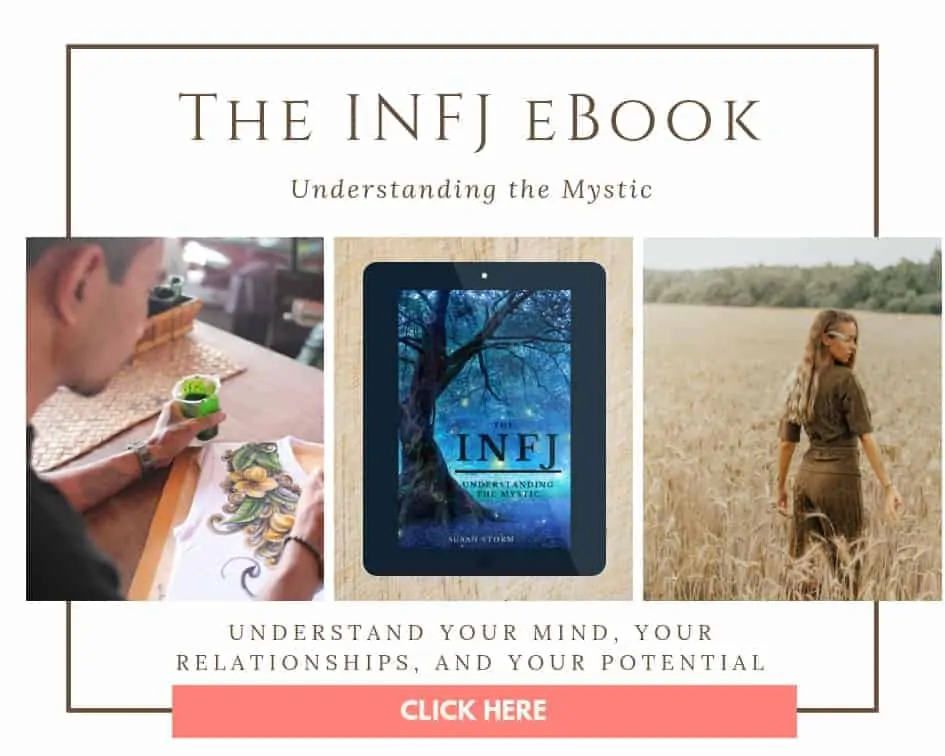



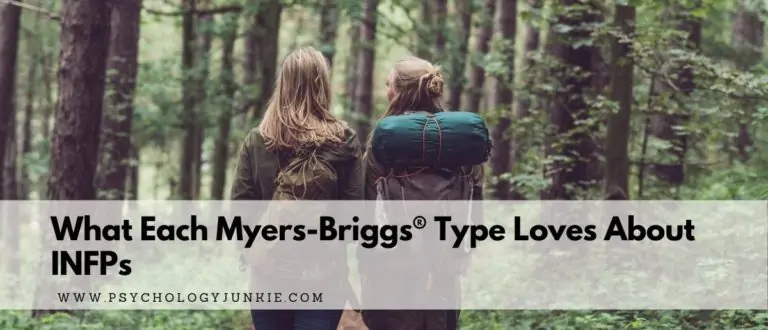


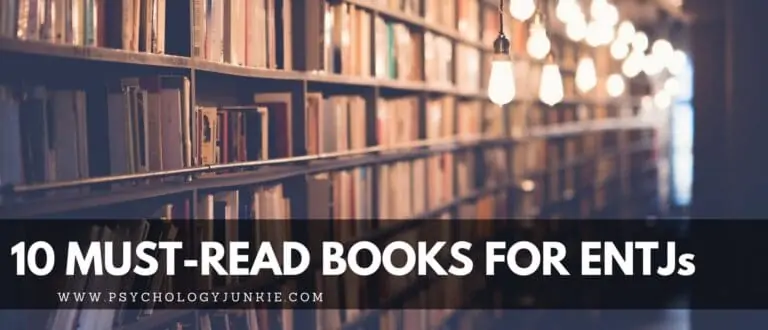


Very interesting article that goes deeper into the dynamics than most. However you might want to check the use of INFP/INFJ as they are sometimes interchanged, creating contradictions.
INFPs and INFJs are both introverted and intuitive, so they share some common personality traits. However, they also have some significant differences. For example, INFJs are more likely to be analytical and focus on details, while IN